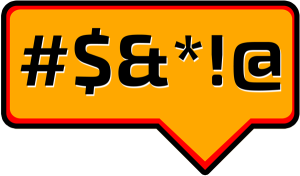
Some industries tolerate a lot more colorful language than others. But even in fields known for cursing, having a foul mouth can cost you big time. Pro football’s Rex Ryan, coach of the Jets, was recently “stunned” that the NFL fined him $100,000 for profanity toward an official. He says he didn’t expect what he thought was a private conversation to result in such a big penalty.
The Things You Say Have An Effect
Probably the language Rex Ryan used was to emphasize what he wanted to say. Then again, maybe he talks like that all the time because he hears it all the time. That old saying, “garbage in, garbage out” definitely comes into play when it comes to our words. So how do we discern when the cost of letting it fly is too high?
- Figure out if you have a tendency to use words like the F-bomb without thinking about it. If you don’t realize what your language is like, you already have a problem because your brain isn’t in gear when your mouth is in motion. While it can be argued that an occasional curse word will emphasize a point, that same word littering your sentences is meaningless pollution.
- Listen to the way upper level management speaks. If your industry doesn’t condone salty language, your saltiness will keep you from advancing. Swearing around the boss is far more offensive when the boss doesn’t ever swear at work. There might be lots of it tossed around the cubicles, but if management doesn’t do it, then you shouldn’t either.
- How do you express frustration or anger to a colleague? A raging rant full of expletives might be a venting mechanism, but it isn’t solving any problems. If all you do is curse the darkness, your contribution is negative. But lighting a candle — working on a solution — shows you have something valuable to offer.
The language we use is part of who we are, but it can give the hearer a negative impression of how you will be in a higher-level position. That false impression is why the language of our lifestyle can ruin a career opportunity. It would be a shame to let it happen to you.

Did you know you can set up your day to have a quick opportunity to improve yourself? One of the nicest things about the internet is the opportunity to learn, and improving your language is going to make a difference in your career.
Here’s why language is important: the things you write online stay there. The impression you make with your speech and writing doesn’t fade too fast, either. If you are consistently using language the way that “everybody” uses language online, then you are automatically closing the street to opportunity.
Learn A Little Every Day
I like Grammar Girl’s Quick and Dirty Tips because they are funny, memorable, and short. You may prefer another source, and there are certainly plenty out there. I also use the Gregg’s Reference Manual. It’s the bible for grammar geeks. What you need is a regular reminder of common mistakes and how to avoid those mistakes that you will enjoy reading. I’m always surprised at the things I learn. Something new every day!
That small, daily dose of language skills is a regular reminder of the importance of language. It might not seem like much, but the proper use of language moves you past barriers that keep your career from flourishing. It might be true that a top executive dictates letters to a secretary instead of writing them personally, but it’s also true that the executive still has to use language competently.
Learning a little every day is part of being a leader. Looking for life-long learning opportunities keeps your brain active and your attitude flexible for the challenges of being an influence both today and in the future. If your language skills are inadequate, you may have the greatest ideas in the world, but you can’t communicate those ideas very well.
Adding something like a daily grammar feature takes less than five minutes to read and enables a lifetime of opportunity.

Networking is one of those activities that gets shelved because you are busy. Unfortunately, it’s also one of those activities that needs to be consistent in order to do any good to your career. This is because the nature of networking is relationships, and if you only connect with people when you need them, you are viewed in a negative light. You also miss out on a lot of positive things when you don’t connect, so it’s a good idea to put it on your schedule.
If LinkedIn Is A Garden, It Has Weeds
One of the most productive professional networking sites available today is LinkedIn, but that success means that there’s spam — the weeds of the web. It gets overwhelming if you don’t do a little maintenance every day. Since the average professional on the site gets far more stuff sent to them than they want, your contact attempts can get lost in the spam weeds.
Use the tools available to you and start with your profile. How do you rank? Who’s looking at your profile? Do you share any interests other than a career category? Think hobbies, non-profits you support, and anything that you share with those names and reach out on a personal level to turn the name into a person for both of you. This connection keeps you from being seen as one more weedy spam item choking their inbox.
Cultivate Connections For Growth
People are living things; they grow and change and need regular maintenance. Since networking is all about people, it makes sense that there’s a need for regular maintenance in this area. You don’t need to spend a lot of time on this, but even 10 or 15 minutes a day checking your LinkedIn page and deliberately reaching out to one person in your network on a personal level will keep that connection healthier.
As you develop these professional relationships by becoming acquainted personally, you lay the groundwork for a mutually beneficial networking experience.

If you are an executive, then you should be on LinkedIn. Don’t think of it as just another social media website because it is not. It is a networking site for business professionals, and simply having a presence can improve your visibility tremendously. Many executives are finding that out the easy way.
Here are 5 solid reasons you should be on LinkedIn right now:
- Many professionals find their next job through contacts they meet on LinkedIn. The social network used to be considered the place to go when you wanted to find a job. Today, it’s much broader than that, but the networking possibilities are endless. And they often lead to better employment prospects.
- It’s a great place to generate leads for your business.
- You have the ability to share your content with your target audience seamlessly. If you are a blogger or routinely craft content on third party websites, you can share it on LinkedIn and reach your professional audience easily. No fighting through the noise on Facebook and Twitter.
- You can publish your articles on LinkedIn and give them wider visibility. You own all your content and can take it with you when you leave–if you ever leave.
- LinkedIn profile page acts like a professional online CV. Every time you make a career move–whether you change jobs, receive a certification, take a career enhancement class, get published, or earn an award for your professional achievements–you can add that to your LinkedIn profile. People do read them, and they do take notice.
Every executive should have a presence on LinkedIn, from CEO down to the middle manager who wants to be CEO.

Searching for executive jobs in today’s world can be tougher than ever. It’s imperative that executive-level job seekers stand out from their competition and prove to their potential employer that they offer a high return on investment. To do this, job seekers need certain tools, including the essential job-search documents needed to effectively market oneself in the job hunt: executive resume, cover letter, career biography, reference dossier, etc.
If you are a part of the executive job hunt remember that personal branding is important to strategically position you ahead of the crowd. It links your key personal attributes, passions and strengths with your value proposition. Does your resume brand you? What about your LinkedIn profile? Does that let the reader know that you are the leader their company needs? If done right this will translate into a crystal clear message that differentiates your unique promise of value that will resonate with your target audience. By showcasing your expertise and unique personal brand in the best possible light, you’ll open doors that others can’t and be in charge or your career destiny.
Make sure you do your research! Tap into the hidden job market by taking advantage of all that’s available online in the way of targeted industry and company research. Check out websites of companies that interest you and start by identifying the challenges they’re facing, learning about the company culture and attempt to track down warm leads at those companies. It’s important to pinpoint how you can have a positive impact and help those companies reach their goals. Save time by identifying and connecting directly with top decision makers at companies through LinkedIn, Facebook, Twitter or other online social networks when possible. Don’t be afraid to reach out to people you’ve never met. LinkedIn is known for its members welcoming connections from unknown contacts. The point is to expand your network and make new connections.
A good executive resume will be the backbone of your job search. It’s important to identify exactly what you want your resume to convey before you get started. Remember, every resume is a one-of-a-kind marketing communication that should tell your story. In order to do that it’s imperative that you make sure your executive resume is well designed and executed. There are a lot of DIY resources and resume writing tips available on the internet that you should take time to review, but in the end it may be better to hire a professional to convey your personal brand. Either way, with a good executive resume in hand that translates your unique attributes you are sure to be on your way to the executive job of your dreams!

Many times, someone will look at the price of having a professional resume writer develop their resume and wonder if it is worth the cost. There’s a way to put the cost of a professional resume service into perspective:
How much will it cost you to stay unemployed and searching for a job?
Say you are hoping to find a job that pays $52,000 a year to make this exercise easy. That means your pay before taxes is $1,000 because there are 52 weeks in a year. If you have been looking for a job and nobody is calling you back, your resume usually has a lot to do with that, so your current resume and job search methods have already cost you however many weeks you’ve been using them.
Now take a look at the prices of the various a la carte services or packages. Look at those prices in terms of the salary you are hoping to earn and the time you have been searching for a job — and think how improving your resume or distribution will improve your chances of finding that job. It may cost you less than one day’s worth of future salary to have your current resume critiqued and know how to improve it. It could be less than a week of your future salary to have a professional resume written.
There’s no guarantee that you’ll get hired with a professionally written resume, but you almost certainly will get called in for an interview, and the rest is up to you. It’s costing you quite a bit in lost wages to use an inferior resume that is not getting results.

LinkedIn’s popular “Who’s Viewed Your Profile” just added a new feature: “How You Rank”. It provides a lot more insight on the way you stack up in this essential network, and that’s good because it also provides suggestions for improving your ranking.
I sure hope you have a profile on LinkedIn because, if you don’t, you are missing out on the best way to network with potential employers, clients, colleagues…and all the rest of the professionals who have joined. Networking is important because the reason why strangers don’t get good jobs is measurable: 92% of recruiters and hiring managers said either “they knew the person or the person was referred by a co-worker or other trusted source. What’s even more interesting – and far more important – is that the primary decision to hire these people was on their actual ability to do the work and excel at it, not on some arbitrary list of skills and experiences.” (Lou Adler did this survey and explains it in the linked article.)
- So the research shows that people who are even vaguely familiar with you are more apt to see your value, and the “How You Rank” tool gives you a customized list of ways to improve your ranking.
- Improving your ranking means that more people are looking at your profile, which means that more people will be familiar with you.
- The more people, particularly professionals in your career field, that are familiar with you — the more apt you are to get a job when you apply.
The customized ways to improve your ranking are pretty important because this is LinkedIn telling you how to get higher rankings on LinkedIn. That means you should pay attention to their suggestions since they know the algorithms for the site. And I like how you can use the tool to track your networking progress and analyze the results. You can even look at the higher ranking people in your network and see how your profile and activity compares to theirs and get a few more ideas on improving yours.
If you want an even more individualized strategy for your LinkedIn enhancement, consider our LinkedIn Profile Development service. The “How You Rank” tool is good, but a professional evaluation that works with you to improve your online brand is better.

One of the ways to improve your online brand is by being active online in ways that focus on your professional arena. You can start out by using search engines to find news in your field, but you can also find niche communities of your peers and connect on social media sites like LinkedIn, Google+, and Facebook.
Once you have some professional places to hang out on the web it’s a good idea to start interacting with others on those sites. Make intelligent comments on blog posts, have discussions that are courteous, and always have a link back to your own blog under your name. Be the opposite of a troll. This gives you a wide audience of people who view you favorably and probably will be interested in visiting your blog to see if there is more good stuff to be found.
When they come to your blog, have some good stuff there. This isn’t as difficult as it sounds:
- link to content that you found helpful and make some comments then ask for opinions
- write a short (250-500 word) post every few days about something in your field
- have a mix of news items and evergreen content that is always useful
If you do a little bit every day, it slowly builds up into an impressive, authoritative presence that gives weight to your online brand. When potential employers look you up online, you look good. Many people actually are hired based on internet activity that created a relationship and developed respect for the knowledge displayed. The job offer came as a result of the added authority of their online presence.
If you decide you need professional help for your online brand, we offer online branding/profile development coaching that just might be what you are looking for.







